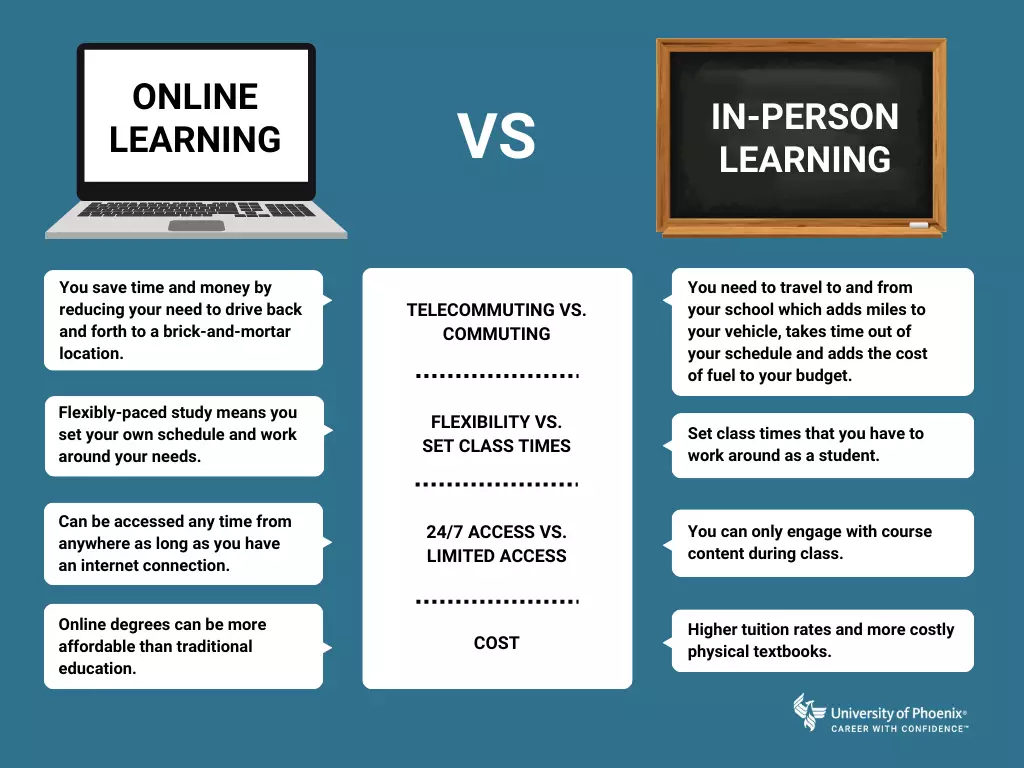Articles > Online College > Advantages of online learning vs. classroom
Advantages of online learning vs. classroom
This article was updated on January 17, 2024.

Reviewed by Hinrich Eylers, PhD, PE, MBA, Vice Provost for Academic Operations and Doctoral Studies.

Online learning vs. classroom learning
While COVID-19 may have brought remote education to more people, online learning vs classroom learning predates the pandemic and offers a completely different experience from watching a professor in an empty classroom struggle with Zoom.
Once considered a novelty, online education is more robust than ever and offers exciting opportunities to learn from any location. But how exactly does online learning compare to in-person classroom learning? What are the benefits of online learning vs. classroom learning?
If you’re new to online programs, it can be a little confusing. We’ll break down a few differences between online learning and in-person classroom learning. Consider how these differences offer unique trade-offs to you.
Commuting vs. telecommuting
At a traditional university in-person class, there’s no getting around the back-and-forth of a commute. You might live an hour away and have to make that trek daily or weekly. This means you’re spending precious time and money traveling when you could instead be learning, working or caring for your family.
A virtual classroom removes the obstacles of geography. All you need is a steady internet connection to catch up on content.
Strict schedules vs. flexibility
A traditional on-campus university is usually an entity with specific class times and limited tolerance for tardiness or absences (even if there’s traffic or you have competing obligations to family or work). If you miss content delivered in person, you might have to rely on a classmate’s notes, or miss out entirely on key concepts that were presented.
But this isn’t the case in the virtual learning environment. All you have to do to catch up on classroom instruction is log in to your online learning portal and consume content, lectures or activities you would have otherwise missed. A single block of time that works within your schedule could potentially be more than enough to get back up to speed.
Limited vs. 24/7 access
While both in-person and online learning have deadlines and requirements for participation, an online learning benefit is that materials can usually be accessed anytime. Whether you’re burning the midnight oil or learning on your lunch break, you can attend class when it works for your schedule.
On-campus classes, on the other hand, might only have materials or content presented in person in the classroom, so if you miss something, you missed it for good.
Cost
The cost of online learning can be lower than that of a traditional university. In addition to enjoying lower tuition rates, online students can save money by not living on campus and by purchasing digital textbooks instead of physical textbooks. When you factor in the savings of time and money from not commuting to campus, online school can feel especially attractive to busy adults who already juggle plenty of demands from work and family.
5 benefits of online learning
Online learning has a lot to offer students, but the common thread is flexibility. From the flexibly paced nature of online classes to the 24/7 access to lectures and materials, online learning prioritizes the needs of students looking to save time and money.
Let’s take a closer look at five of the key benefits.
1. Easy access to instructors and peers
As long as you have a reliable computer and internet connection, you can connect with your peers and instructors through a school’s learning portal.
Online institutions like University of Phoenix create opportunities for one-on-one connections with both instructors and peers for a learning experience that’s tailored to each student’s interests and needs. Given the online format, you can find the time in your schedule to connect for interactions that are both convenient and helpful.
2. Affordability
We’ve already touched on how learning online can be less costly than traditional higher education, but even online universities can vary in terms of affordability. The cost per college credit is only part of the equation. Some online colleges charge per credit hour, some charge per course and still others charge per semester.
University of Phoenix offers fixed tuition rates for your program, which lock in your tuition rate at enrollment. This gives students peace of mind and the ability to plan ahead because they know exactly what they’ll be paying throughout the duration of their program.
3. Enhanced work–life balance
Balancing responsibilities with work and life commitments is hard enough when you’re not a student. Taking in-person classes three or more days per week can present an entirely new challenge on top of all these things.
While both online and in-person college require timely completion of assignments, the online format allows students to learn from home. This provides a flexibility to listen to lectures or review content while the kids are at soccer practice or you’re making dinner — whenever works best for you.
4. Reasonable pacing
In addition to being able to access course assignments and information on your own schedule, some online universities, like University of Phoenix, allow students to take just one class at a time. This enables you to learn at a pace that fits into the rest of your life, which can enhance your overall retention of the course’s subject matter.
5. 24/7 availability
The internet is always on — which means even when traditional universities are turning out the lights and locking up for the night, you can be responding to peers or faculty about the latest class discussion or completing assignments. You can rewatch recorded lectures or access your course materials at any time. And if you missed what your instructor said, no worries. Just replay the video.
University of Phoenix and other online universities have accredited online program offerings, instructors with real-world experience and degree programs designed to cultivate value-driven skills in students. All of this — along with other benefits like University of Phoenix’s 5- or 6-week classes, fixed-rate tuition, course flexibility and lifetime career counseling — ensure that today’s students enjoy a range of advantages inherent to online learning.
When it comes to pursuing higher education, there are more options than ever. It’s just a matter of researching the pros and cons of what’s available to decide which path is your path.
If you think your work and life commitments and needs would benefit from full-time or part-time online courses, be sure to take a look at University of Phoenix’s offerings, which include degree programs in business, IT, healthcare, education and other career-focused fields of study. Certificates, which can sometimes be completed in under a year, offer relevant skills in business, technology, education and healthcare.
Is it time to try online learning vs. classroom learning?
When it comes to pursuing higher education, there are more options than ever, especially when it comes to online learning vs. classroom education. It’s just a matter of researching the pros and cons of what’s available to decide which path is your path.
University of Phoenix and other online universities have accredited online program offerings, instructors with real-world experience and degree programs designed to cultivate value-driven skills in students. All of this — along with other benefits like University of Phoenix’s 5- or 6-week classes, fixed-rate tuition, course flexibility and lifetime career counseling — ensure that today’s students enjoy a range of advantages inherent to online learning.
If you think your work and life commitments and needs would benefit from full-time or part-time online courses, be sure to take a look at University of Phoenix’s offerings, which include degree programs in business, IT, healthcare, education and other career-focused fields of study. Certificates, which can sometimes be completed in under a year, offer relevant skills in business, technology, education and healthcare.

ABOUT THE AUTHOR
Brian Fairbanks is a freelance writer with a background in SEO content creation and blog article development.

ABOUT THE REVIEWER
Dr. Eylers is the University of Phoenix vice provost for Academic Operations and Doctoral Studies. Prior to joining the University in 2009, Dr. Eylers spent 15 years in environmental engineering consulting, sustainability consulting, teaching and business and technology program management. He was amongst the first to be licensed as a professional environmental engineer in Arizona.
This article has been vetted by University of Phoenix's editorial advisory committee.
Read more about our editorial process.




